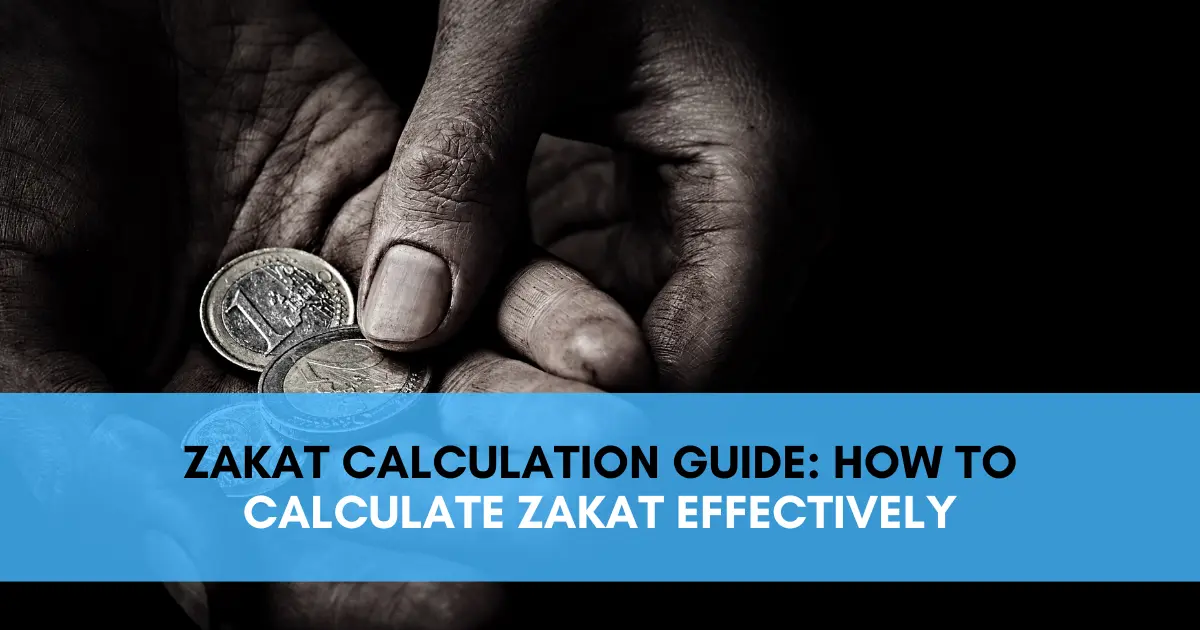Zakat Calculation Guide: How to Calculate Zakat Effectively

United Nations Development Programme (UNDP) 2018 report reveals an estimated Zakat pool between US$200 billion and US$1 trillion. Another potential statistic by UNHCR highlights $38,087,330 Zakat to more than 1.5 million refugees and IDPs in 2022. Zakat is far beyond only a religious obligation for Muslims with a deep understanding of Islamic principles, financial literacy, and compassion for those in need.
Zakat donations require the greatest check and balance to ensure they reach eligible recipients including orphans, refugees, and other impoverished strata of the society. To make sure the most vulnerable people are not overlooked, it is important to know how to calculate zakat for equal distribution of wealth to every needy person without any mishandling. Let’s delve into the useful insights for the right dispensation of the assets.
The Quran emphasizes Zakat as follows;
‘’Those (Muslims) who keep something from their wealth a known (significant) part for the needy and impoverished, they are rewarded in Gardens of Bliss.” Quran 70:24-35
Why Do You Need to Pay Zakat?
Zakat is rooted in the cores of the Quran and Sunnah providing significant guidelines on wealth eligibility, Nisab threshold, and Zakat subject to the categories of wealth. Every eligible Muslim needs to pay Zakat for the following reasons.
- Upholding Islamic values
- Purification of wealth in life
- Helping less fortunate people
- Achieving divine bliss
- Keeping wealth in circulation
- Fostering social solidarity
- Bolstering economic prosperity
Unlock Wealth Categories Subject to Zakat
Every year millions of well-off Muslims share a significant chunk of Zakat to the vulnerable classes of the society. The scope of Zakat shrinks or expands with the possession of total financial assets. The wealth categories provide a solid guide on how much Zakat to pay. Islam applies Zakat to eligible wealthy Muslims based on the asset categories discussed below.
Precious Metals
- Gold and silver are the traditional measures of wealth in Islam to make the total Zakat calculation.
- 2.5% Zakat is applied to the total possession of precious metals.
Cash Amount
- Zakat is on the money held in the bank accounts in the form of cash savings or investments.
Business Merchandise
- If the goods held for sale are business, they come in the Zakat net based on the total worth of the saleable goods.
Livestock
- Cattle and animals used for commercial purposes including milk, meat, and other products.
Agricultural Yield
- Farmers grow different crops and the Zakat applies only to the crops grown for sale.
Monetary Investments
- Financial bonds, stocks and other financial instruments fall under the Zakat-eligible category.
Your Potential Guide to Zakat Calculation
Finding a workable solution to calculate zakat on money with precision and accuracy is not as simple as it appears. If you want to experience ease in paying Zakat, use the correct Nisab values for accurate results. Work out how much Zakat to pay with a professional Zakat calculator and get a quick guide then donate Zakat online anytime. Take a glance at the following steps about how to calculate zakat on cash and other assets.
Step 1: Eligible Assets Details
The first step begins by identifying all assets eligible for Zakat. This includes cash, gold, silver, business inventory, investments, and any other savings.
Step 2: Calculate Entire Assets
Find the total average value of all Zakatable assets. Convert the values of assets denominated in foreign currencies or other commodities equivalent to your local currency based on prevailing exchange rates.
Step 3: Liabilities Deduction
Deduct any outstanding liabilities from the total assets, such as debts that are due for payment. Only net assets after deduction are subject to Zakat.
Step 4: Calculate Due Zakat
Zakat is due when a person meets the Nisab threshold but the value fluctuates based on the current market prices of gold and silver. Multiply the total value of your assets (after deducting liabilities) by the applicable Zakat rate, typically 2.5% (or 1/40th) of your wealth.
For livestock, agricultural yield, etc. The zakat rate is different. Due date of payment for surplus personal and business assets and livestock is one lunar year whereas for agricultural yield it’s due at the time of harvest.
Step 5: Zakat Distribution
Zakat should be distributed to vulnerable individuals of society. This includes the poor and needy, debtors, those in financial difficulty, new Muslims, travelers, and others specified in Islamic law.
Zakat Faces Challenges
Modern Financial Instruments: Posing Hurdle
- Modern financial channels such as digital currency, and complex investment instruments impede smooth calculation of Zakat. Scholars and financial experts continuously evaluate these new forms of wealth to ensure compliance with Islamic laws.
Income in the Zakat Net: An Ongoing Debate
- Modern scholars argue for the inclusion of income in Zakat calculations. The modern economies where income is the primary source of wealth accumulation need to be subject to Zakat.
Spotlight Viable Solutions
Use Digital Zakat Calculators
- Several online Zakat calculators and advanced tools are available to make your Zakat work out with accurate insights on current asset values and liabilities.
Boost Zakat Knowledge
- Zakat requires knowledge of both Islamic jurisprudence and financial principles. Seek practical guidance from scholars with religious acumen to help you navigate complex financial situations.
Calculating Zakat with accuracy involves the understanding of all the aspects discussed above. Islam proposes definite rules of Zakat and assets subject to donation embodying the spirit of charity and social responsibility. It is a fundamental practice that strengthens the edifice of global Muslim communities. Ensure equitable distribution of wealth and support for those in need. By adhering to advanced online tools, accurate Zakat calculation is a few steps away. Let’s put all the confusion to rest, Muslims can fulfill their Zakat obligations with confidence and integrity by following Islamic guidelines.
